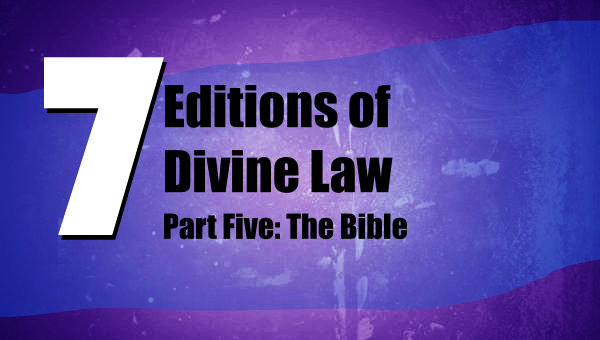By Tyson Thorne

The fifth edition is the Bible — the entire Scripture — complete and sufficient for our every spiritual need. In the 15th chapter of his letter to the Romans Paul writes, “For everything that was written in the past was written to teach us, so that through endurance and the encouragement of the Scriptures we might have hope.”
Paul was writing about the Scriptures that were recognized up to that time, which was primarily the Tanakh — the Law, Prophets and sacred writings — also called Mikra. The Torah consists of the first five books of the Bible, written (mostly) by Moses and is the entirety of the first section of the Tanakh, the Law. I'm providing this bakcground of the development of the Old Testament because I want ot overcome a few misconceptions people have about the Bible.
The first lesson is that the Bible is not a bunch of oral traditions, handed down over centuries. Each book was written by either the men who claim to have written them, or by the authors traditionally attributed to those works. The original writings are ancient and no longer exist, but we have copies of the writings as they were handed down. Which leads naturally to the second lesson, which is that the entire Old Testament was already established by the time of Jesus. In fact, it had already been translated into two other languages, Aramaic and Greek, and Jewish rabbis were already hard at work writing commentaries on these books.
Paul and the other disciples wrote the New Testament (with the possible exception of the book of Hebrews, which was either Paul or Apollos). Other "gospels" supposedly written by other biblical characters (usually covered by major media outlets around Easter and Christmas) are proven as fakes. They were largely known by the church and disregarded. In fact, the cannon of the New Testament was established by the middle of the second century. The accepted books were already circulated by the churches, and many of the churches had complete collections of the same books we have today.
This leads to the third misconception about the Bible (and specifically the New Testament), that it was carefully put together by authorities in the Catholic church. What happened at the Council of Trent was not a compiling of the New Testament, it was a testing to assure the early church had made the right decissions. All that was truly done was a ratification of the books, a kind of affirmation through careful investigation. In fact, there is evidence in the Bible itself that many books, including the Gospels, were already accepted as divine literature during the life of the apostles (see 2 Peter 3.15-16 as one example) . So any stories you may have heard about the Bible being assembled (and possibly edited) by the Catholic church, or even ridiculous fictions like the New Testament being written by a group of guys around a campfire (a popular myth spread by some atheists in the 1980's), simply isn't true. These books were accepted as God's word by those who lived during the time of Jesus and the apostles.
All of this is to say that the Bible, from the Genesis to Revelation, is the complete collection of God's word to humanity. Like the Ten Commandments, these are God's own words. Unlike the big 10, they were written not by God himself, but using the hand of men as they were carried along by not dictated to by) the Holy Spiri0. In this way they record what God intended. This makes the Bible the fifth edition of divine law.
Why is this important? For two reasons. First, there is meaning behind God's self-revelation through law - a law that is as powerful as the physics that control our universe. God's law reveals God's character. Understanding all seven editions of divine law has many benefits. Yes, we learn about God's character which is huge, but there are other reasons too. We learn what God wants for us, how to draw nearer to him through our way of life, and how to love God back by keeping the laws. Which leads us to the second reason, because we cannot obey laws we are ignorant of. In John 14.15 Jesus said, "If you love me you will obey my commandments." The more we know and understand divine law, the more we can love God by keeping it.
|
|
